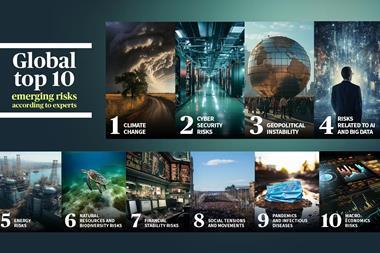Companies must accelerate their response to a more pervasive and complex risk environment and take steps to reinvent risk management. Here’s how
The current risk landscape is characterised by mega shocks, disruption and volatility.
Disruptive weather events, geopolitical upheaval and economic uncertainty are the new normal. Risk professionals, including the most experienced, are under growing pressure and scrutiny.

This is reflected in the Accenture Risk Study: 2024 Edition, which found that over eight in 10 risk professionals say complex, interconnected risks are emerging more quickly.
Among the top rising risks are operational risks (30%); financial risks (30%); and disruptive technology risks (29%). Also growing in importance since 2021 is regulatory and compliance risk at 27%.
“You can’t think about risks in isolation,” says Riccardo Roscini, head of group enterprise risk management, at UniCredit.
Research highlights
The findings in the report are based on a survey of more than 700 risk professionals across Australia, Brazil, Canada, France, Germany, Italy, Japan, Mexico, New Zealand, Saudi Arabia, Singapore, Spain, the United Arab Emirates, the United Kingdom and the United States between April and June 2023.
Key findings show that risk professionals are feeling the strain:
- 83% say that complex, interconnected risks are emerging more rapidly
- 81% say risks in other sectors are now important to their business
- 77% say risks are more difficult to detect and manage
- 72% say their risk management capabilities have not kept pace with the rapidly changing landscape
A web of risks to mitigate and manage
The Accenture research shows that individual risks can quickly become serious threats when interconnected, creating a web of risks to mitigate and manage.
For example, operational risks are also escalating strategic, regulatory and compliance, financial, data risk and privacy breaches and disruptive technology risks.
Complicating matters, research respondents report that risks are migrating across sectors.
“In today’s digital world, risk is everyone’s business because risk is everywhere.”
Accenture says that in this new landscape, companies need to think differently about mitigating and navigating risk.
The report reads: ”In part, this means modernising the risk function’s skills and technologies. But it also means establishing a risk mindset across the entire organisation so that every function and employee has the tools and capabilities to detect and mitigate threats.
“In today’s digital world, risk is everyone’s business because risk is everywhere.”
Reinventing risk management
Companies must accelerate their response to a more pervasive and complex risk environment and take steps to reinvent risk management.
They can follow the path set by the risk leaders surveyed as part of the Risk Study: 2024 Edition. These are the respondents who were ranked as more mature according to the survey data.
Accenture says that companies looking to reinvent and pivot their risk management can emulate risk leaders in four ways:
1) Invest in new and emerging technologies to better detect, quantify and mitigate risks across the enterprise
57% of risk leaders say that investing in new technology for the risk team is a top-three priority, compared with 24% of those that have less mature capabilities.
In parallel, 96% of leaders are urgently improving their ability to collect enterprise-wide data, compared with 59% of the less mature group
2) Create risk leaders of the future to unlock business resilience and growth
51% of risk leaders say bringing new skills into the function is a top priority, compared with 24% of the less mature group.
3) Maximise the risk function’s agility to respond quickly to emerging threats through more robust capabilities and a flexible architecture
Risk leaders are far more agile than their peers. They are nearly 4 time more likely to say they are “very agile” when it comes to using cloud platforms, tools and services to rapidly execute risk processes when compared to the less mature group.
4) Make risk everyone’s business
57% of risk leaders are “very satisfied” with their business’s ability to develop the skills needed to detect and mitigate risk, compared with only 27% of the less mature group
Eight skills risk practitioners will need to embrace:
- Leadership: With the risk landscape changing so quickly, senior risk profesionals need to demonstrate and influence company leadership to drive change.
- Mindset: The rapid emergence of new risks and the tools to mitigate them requires a forward-thinking mindset open to learning and embracing new methods of working.
- Judgment: With automation reducing the volume of manual processdriven work, risk professionals will increasingly be asked to exercise their judgment and make decisions based on multiple inputs.
- Relationship management: As risk professionals pivot from operational support to business partner roles, they need to enhance their ability to build and maintain relationships.
- Business understanding: A detailed understanding of the business and its strategy is needed to constructively challenge leadership and support growth initiatives.
- Extended knowledge-base: As new risks emerge, risk professionals ought to build up their knowledge of non-financial risks, crisis management, security and sustainability.
- Data use and management: As risk teams use more and more data, risk practitioners need to be well-versed in data-quality management, validation, report generation and exception identification.
- Data science: Expertise in data science and the ability to visualize and explain advanced analytics is becoming essential.




















No comments yet